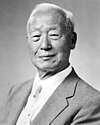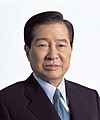List of presidents of South Korea
The president of the Republic of Korea serves as the chief executive of the government of the Republic of Korea and the commander-in-chief of the Republic of Korea Armed Forces.
The South Korean government constitutionally considers the Korean Provisional Government (KPG) to be its predecessor.[1][2][3][4][5][6] The KPG was established in 1919 as a government in exile in Shanghai during the Japanese occupation of Korea. It had nine different heads of state between September 1919 and August 1948.
The presidential term has been set at five years since 1988. It was previously set at four years from 1948 to 1972, six years from 1972 to 1981, and seven years from 1981 to 1988. Since 1981, the president has been barred from re-election. The president must be a South Korean citizen, at least 40 years old, who has lived in South Korea for 5 years.
The incumbent president is Yoon Suk Yeol, who assumed office on 10 May 2022.[7]
List of presidents
[edit]| Political parties |
|---|
| Status |
Denotes acting president
|
| No. | Portrait | Name (Birth–Death) |
Term of office | Political party | Election | ||
|---|---|---|---|---|---|---|---|
| Took office | Left office | Time in office | |||||
| Presidents of the First Republic | |||||||
| 1 | 
|
Syngman Rhee 이승만 李承晩 (1875–1965) |
24 July 1948 | 26 April 1960 | 11 years, 277 days | NARRKI
Liberal |
1st (1948)
2nd (1952) 3rd (1956) March 1960 |
| — | 
|
Ho Chong 허정 許政 (1896–1988) Acting |
27 April 1960 | 15 June 1960 | 50 days | Independent | — |
| Presidents of the Second Republic | |||||||
| — | 
|
Kwak Sang-hoon 곽상훈 郭尙勳 (1896–1980) Acting |
16 June 1960 | 23 June 1960 | 7 days | Democratic | — |
| — | 
|
Ho Chong 허정 許政 (1896–1988) Acting |
23 June 1960 | 7 August 1960 | 46 days | Independent | — |
| — | 
|
Baek Nak-jun 백낙준 白樂濬 (1895–1985) Acting |
8 August 1960 | 12 August 1960 | 5 days | Independent | — |
| 2 | 
|
Yun Po-sun 윤보선 尹潽善 (1897–1990) |
13 August 1960 | 24 March 1962 | 1 year, 224 days | Democratic
New Democratic |
4th (August 1960) |
| — | 
|
General Park Chung Hee 박정희 朴正熙 (1917–1979) Chairman of the SCNR |
24 March 1962 | 16 December 1963 | 1 year, 268 days | Military | — |
| President of the Third Republic | |||||||
| 3 | 
|
Park Chung Hee 박정희 朴正熙 (1917–1979) |
17 December 1963 | 26 December 1972 | 9 years, 10 days | Democratic Republican | 5th (1963)
6th (1967) 7th (1971) |
| Presidents of the Fourth Republic | |||||||
| (3) | 
|
Park Chung Hee 박정희 朴正熙 (1917–1979) |
27 December 1972 | 26 October 1979[n 1] | 6 years, 304 days | Democratic Republican | 8th (1972)
9th (1978) |
| — | 
|
Choi Kyu-hah 최규하 崔圭夏 (1919–2006) |
26 October 1979 | 6 December 1979 | 42 days | Independent | — |
| 4 | 6 December 1979 | 16 August 1980[n 2] | 255 days | 10th (1979) | |||
| — | Park Choong-hoon 박충훈 朴忠勳 (1919–2001) Acting |
16 August 1980 | 31 August 1980 | 15 days | Democratic Republican | — | |
| 5 | 
|
Chun Doo-hwan 전두환 全斗煥 (1931–2021) |
1 September 1980 | 24 February 1981 | 177 days | Military | 11th (1980) |
| President of the Fifth Republic | |||||||
| (5) | 
|
Chun Doo-hwan 전두환 全斗煥 (1931–2021) |
25 February 1981 | 24 February 1988 | 7 years, 0 days | Democratic Justice | 12th (1981) |
| Presidents of the Sixth Republic | |||||||
| 6 | 
|
Roh Tae-woo 노태우 盧泰愚 (1932–2021) |
25 February 1988 | 24 February 1993 | 5 years, 0 days | Democratic Justice
Democratic Liberal Independent |
13th (1987) |
| 7 | 
|
Kim Young-sam 김영삼 金泳三 (1927–2015) |
25 February 1993 | 24 February 1998 | 5 years, 0 days | Democratic Liberal
New Korea Independent |
14th (1992) |
| 8 | 
|
Kim Dae-jung 김대중 金大中 (1924–2009) |
25 February 1998 | 24 February 2003 | 5 years, 0 days | National Congress
Millennium Democratic Independent |
15th (1997) |
| 9 | 
|
Roh Moo-hyun 노무현 盧武鉉 (1946–2009) |
25 February 2003[n 3] | 24 February 2008 | 5 years, 0 days | Millennium Democratic
Independent Uri Independent |
16th (2002) |
| 10 | 
|
Lee Myung-bak 이명박 李明博 (born 1941) |
25 February 2008 | 24 February 2013 | 5 years, 0 days | Grand National
Saenuri |
17th (2007) |
| 11 | 
|
Park Geun-hye 박근혜 朴槿惠 (born 1952) |
25 February 2013 | 10 March 2017[n 4] | 4 years, 14 days | Saenuri
Liberty Korea |
18th (2012) |
| — | 
|
Hwang Kyo-ahn 황교안 黃敎安 (born 1957) Acting |
9 December 2016 | 9 May 2017 | 152 days | Independent | — |
| 12 | 
|
Moon Jae-in 문재인 文在寅 (born 1953) |
10 May 2017 | 9 May 2022 | 5 years, 0 days | Democratic | 19th (2017) |
| 13 | 
|
Yoon Suk Yeol 윤석열 尹錫悅 (born 1960) |
10 May 2022 | Incumbent | 2 years, 180 days | People Power | 20th (2022) |
Timeline
[edit]
| Ideology | # | Time in office | Name(s) | |
|---|---|---|---|---|
| Conservative | 9 | 21615 days[a] | Choi Kyu-hah, Chun Doo-hwan, Kim Young-sam, Lee Myung-bak, Park Chung Hee, Park Geun-hye, Roh Tae-woo, Syngman Rhee, and Yoon Suk Yeol (incumbent) | |
| Liberal | 4 | 6067 days | Kim Dae-jung, Moon Jae-in, Roh Moo-hyun, and Yun Po-sun | |
| Timeline of South Korean governments |
|---|
 |
See also
[edit]- Government of South Korea
- Lifespan timeline of presidents of South Korea
- List of monarchs of Korea
- List of presidents of South Korea by time in office
- List of presidents of the Provisional Government of the Republic of Korea
- List of prime ministers of South Korea
- Presidential elections in South Korea
- Provisional Government of the Republic of Korea
- Vice President of South Korea
Notes
[edit]- ^ As of 5 November 2024
- ^ Died in office.
- ^ Removed by coup d'état.
- ^ From 12 March to 14 May 2004, Prime Minister Goh Kun served as an acting president. It was because of the National Assembly's motion to impeach him. He later returned to his post after the Constitutional Court refused to impeach him.
- ^ Impeached and removed.
References
[edit]- ^ Myers, Brian Reynolds (21 February 2018). "Constitutional Reform and Inter-Korean Relations: Part 2". Sthele Press. Retrieved 25 June 2019.
- ^ Myers, Brian Reynolds (26 July 2018). "Confederation (Again)". Sthele Press. Retrieved 25 June 2019.
Nor, for that matter, is the new line that the Taehan minguk was not founded in August 1948, but instead came into existence when a provisional government was formed in Shanghai in 1919. I don't need to remind anyone of the internationally accepted criteria for statehood. The Blue House seems more interested in downgrading the republic that fought the North than in making a serious case for the statehood of something else. The original modest budget for the 70th anniversary of the ROK's founding has already been cut. The joint North-South commemoration of the March 1st uprising's 100th anniversary next year is likely to make the festivities this August 15 look subdued in comparison.
- ^ Myers, Brian Reynolds (7 April 2019). "South Korea's Nationalist-Left Front". Sthele Press. Retrieved 25 June 2019.
In closing, let me forestall reductio ad absurdum by again conceding that the left's discourse is by no means uniform. The 'radical' praises the North. The 'moderate' assails those who mistrust it. The one denies the legitimacy of the ROK founded in 1948. The other talks up the ROK-superseding legitimacy of an exile republic said to date back to 1919. But such differences are rhetorical, tactical. The point of the front after all is to appeal to all the constituencies it needs. One of them is the US government.
- ^ Myers, Brian Reynolds (4 March 2019). "On That March First Speech". Sthele Press. Retrieved 25 June 2019.
- ^ Myers, Brian Reynolds (11 August 2017). "Low-Level Confederation and the Nuclear Crisis (in 2 parts)". Sthele Press.
Yi Hae-sŏng, a young podcaster, was one of many conservatives who lamented Moon's reference to 1919 as the year in which the Republic of Korea was established. With those and other words, the president declared himself the heir to a nationalist and not a constitutional-democratic tradition, a man who will rule more in the spirit of the exile government that strove to liberate the minjok than of the republic that joined America in resisting North Korean aggression.
- ^ Myers, Brian Reynolds (4 March 2019). "On that March First Speech". Sthele Press. Retrieved 26 June 2019.
- ^ "Profile - Yoon Suk Yeol - President of the Republic of Korea". Office of the President - Republic of Korea. Retrieved 23 February 2024.




